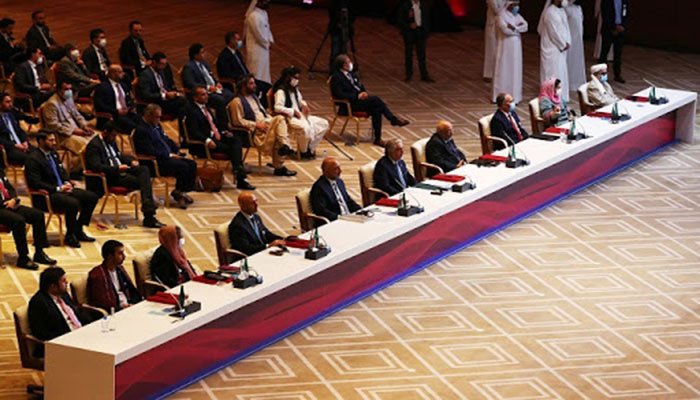Afghan negotiators resume talks in Doha
ISLAMABAD: Afghan negotiators were resuming talks with the Taliban in Doha on Tuesday aimed at finding an end to decades of relentless conflict even as hopes wane and frustration and fear grow over a spike in violence across Afghanistan that has combatants on both sides blaming the other.
Torek Farhadi, a former Afghan government adviser, said the government and the Taliban are “two warring minorities,” with the Afghan people caught in between — “one says they represent the republic, the other says we want to end foreign occupation and corruption. But the war is (only) about power.”
The stop-and-go talks come amid growing doubt over a US-Taliban peace deal brokered by outgoing President Donald Trump. An accelerated withdrawal of US troops ordered by Trump means just 2,500 American soldiers will still be in Afghanistan when President-elect Joe Biden takes office this month. Biden has advocated keeping a small intelligence-based presence in Afghanistan, but Taliban leaders have flatly rejected any foreign troops. Officials familiar with the US-Taliban peace deal say there is no wiggle room that would allow even a small number of foreign troops to remain.
“The initial opportunity is that several items of the agenda are similar and would be easy to make progress on,” says Nader Nadery, a member of the government’s negotiation team, without giving specifics. Nadery, however, warned that spiraling violence will increase public pressure on government negotiators that could derail talks.
Perhaps one of the trickiest items is a power-sharing agreement. There is little evidence that the Kabul government will be willing to share power or that the Taliban will be flexible on who would be acceptable in a transitional administration.
Taliban spokesman Mohammad Naeem said the Taliban were ready for a resumption of the negotiations, adding that a ceasefire is one of the agenda items, without elaborating. Anas Haqqani seemed to indicate in a tweet last month that he had problems with some of the so-called progressive changes in Afghanistan.
-
 Milo Ventimiglia Calls Fatherhood 'pretty Wild Experience' As He Expects Second Baby With Wife Jarah Mariano
Milo Ventimiglia Calls Fatherhood 'pretty Wild Experience' As He Expects Second Baby With Wife Jarah Mariano -
 Chinese Scientists Unveil Advanced AI Model To Support Deep-space Exploration
Chinese Scientists Unveil Advanced AI Model To Support Deep-space Exploration -
 Anthropic’s New AI Tool Wipes Billions Off Cybersecurity Stocks
Anthropic’s New AI Tool Wipes Billions Off Cybersecurity Stocks -
 Trump Announces He Is Sending A Hospital Ship To Greenland Amid Rising Diplomatic Tensions
Trump Announces He Is Sending A Hospital Ship To Greenland Amid Rising Diplomatic Tensions -
 'Never Have I Ever' Star Maitreyi Ramakrishnan Lifts The Lid On How She Avoids Drama At Coffee Shops Due To Her Name
'Never Have I Ever' Star Maitreyi Ramakrishnan Lifts The Lid On How She Avoids Drama At Coffee Shops Due To Her Name -
 Inside Prince William’s Plans For Prince Harry: What Will Happen To Duke Once He’s King
Inside Prince William’s Plans For Prince Harry: What Will Happen To Duke Once He’s King -
 Chyler Leigh Pays Moving Homage To 'Grey’s Anatomy' Co-star Eric Dane: 'He Was Amazing'
Chyler Leigh Pays Moving Homage To 'Grey’s Anatomy' Co-star Eric Dane: 'He Was Amazing' -
 Did You Know Tech CEOs Limit Screen Time For Their Own Kids?
Did You Know Tech CEOs Limit Screen Time For Their Own Kids? -
 Matthew Lillard Admits Fashion Trends Are Not His 'forte'
Matthew Lillard Admits Fashion Trends Are Not His 'forte' -
 SpaceX Launches Another Batch Of Satellites From Cape Canaveral During Late-night Mission On Saturday
SpaceX Launches Another Batch Of Satellites From Cape Canaveral During Late-night Mission On Saturday -
 Princess Beatrice, Eugenie Get Pulled Into Parents’ Epstein Row: ‘At Least Stop Clinging!’
Princess Beatrice, Eugenie Get Pulled Into Parents’ Epstein Row: ‘At Least Stop Clinging!’ -
 Inside Kim Kardashian's Brain Aneurysm Diagnosis
Inside Kim Kardashian's Brain Aneurysm Diagnosis -
 Farmers Turn Down Millions As AI Data Centres Target Rural Land
Farmers Turn Down Millions As AI Data Centres Target Rural Land -
 Trump Announces A Rise In Global Tariffs To 15% In Response To Court Ruling, As Trade Tensions Intensify
Trump Announces A Rise In Global Tariffs To 15% In Response To Court Ruling, As Trade Tensions Intensify -
 Chappell Roan Explains Fame's Effect On Mental Health: 'I Might Quit'
Chappell Roan Explains Fame's Effect On Mental Health: 'I Might Quit' -
 AI Processes Medical Data Faster Than Human Teams, Research Finds
AI Processes Medical Data Faster Than Human Teams, Research Finds




